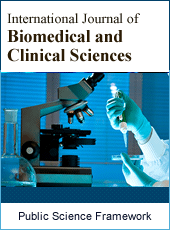International Journal of Biomedical and Clinical Sciences
Articles Information
International Journal of Biomedical and Clinical Sciences, Vol.5, No.2, Jun. 2020, Pub. Date: Apr. 14, 2020
The Effectiveness of Acceptance and Commitment Based Group Therapy on Anxiety, Depression and Mental Health in Patients with Cancer
Pages: 87-94 Views: 1905 Downloads: 420
[01]
Maliheh Ramezaninezhad Godarzi, Faculty of Psychology, University of Lincoln, Kuala Lumpur, Malaysia.
[02]
Ali Akbar Rahmatiyan, Faculty of Psychology, University of Lincoln, Kuala Lumpur, Malaysia.
The main purpose of this study was to evaluate the effectiveness of acceptance and commitment based group therapy on anxiety, depression and mental health of patients with cancer in Sari. The research method was quasi-experimental with pre-test and post-test with two groups of experimental and control. The statistical population consisted of cancerous patients referred to Sari city. The statistical sample of the study consisted of 60 subjects, two groups (30 experimental group and 30 control group) who were voluntarily and purposefully selected and were randomly divided into experimental and control groups. Anxiety, Beck Depression Inventory and Mental Health Questionnaire were used for data collection. Multivariate and univariate analysis of covariance were used for data analysis. Findings of the present study show that group therapy based on acceptance and commitment is effective on anxiety, depression and mental health of cancerous patients. The findings of this study indicate the effect of acceptance and commitment group therapy on anxiety, depression and mental health of cancerous patients and its consistency with previous research findings indicates the effectiveness of acceptance and commitment group therapy in Cancer that is recognized as an effective and useful treatment and should be addressed further.
Group Therapy, Anxiety, Depression, Mental Health
[01]
Crisrofani, T, Bragliou, U, Cornery, R, Jacson, A & Fritc. T (2007). The Outcome Of Group Parent Training For Families Of Children With Attention Deficit Hyperactivity Disorder And Defiant/ Aggressive Behavior. Journal Of Behavior Therapy And Experimental Psychiatry, Volume 37, Issue 3. September 2008, Pages 188-205.
[02]
Mardanhamoule, G. & Shahrakivahed, R. (2009). The effect of education. Optimism to the way of story-telling on increasing students` optimism. Clinical psychology magazine.
[03]
Kasemir, W. & Long, F. (2014). “Nursery in cancer”, Sharoufi, A. Chehr pub.
[04]
Khoshnoud, A. Comparing graphic characteristics of family painting and attachment style in two groups of children with urinary incontinence and nail chewing (2015). Ma thesis. Azad University Tehran center branch.
[05]
Helzner, Kolmer, K, Sprantroijer, C. (2011). Nocturnal enuresis. American Family Physician, 67: 1499-1506, 1509-1510.
[06]
Behrman, E. R., Kliegman, M. R. & Jenson, B. H. (2007). Nelson textbook of pediatrics. 18th ed. Philidelphia Saunders; 113: 2249.
[07]
Scoria. T (2013). The Outcome of Group Parent Training For Families of Children with Attention Deficit Hyperactivity Disorder and Defiant/ Aggressive Behavior. Journal of Behavior Therapy and Experimental Psychiatry, Volume 37, Issue 3. September 2008, Pages 188-205.
[08]
Fiyour, N. (2014). “Psychology of cancer”. Javaherkalam, F. Paeez pub.
[09]
Gogh, W. (2015). Reality therapy: A new approach to psychiatry. New York.
[10]
Pourfaraj Omran, M.; Edris Arimi, O. & Mazdarani, Sh. (2017). Efficacy of behavioral activating on sleeplessness treatment and improving sleep quality of clients to Sari psychological center, international congress of social science, psychology and educational science universal achievement.
[11]
Lanc, M, Koin, G. (2014). Psychotherapy whit older adults. California: Sage publications.
[12]
Ghahramani, M., Basiri Moghadam, M. & Ghahramani, A. A (2008). Nocturnal Enuresis and Impact on Growth Iran J Pediater; 18 (2): 167-170.
[13]
Schwartz, K. (2007). Remembering the forgotten: Psychotherapy groups for the nursing home resident. International journal of group psychotherapy, 57 (4), 497-514
[14]
Jakobsson, S., Ekman, T. & Ahlberg, K. (2008). Components that influence assessment and management of cancer-related symptoms: an interdisciplinary perspective. Oncol Nurs Forum. 2008 Jul; 35 (4): 691-8. doi: 10.1188/08.ONF.691-698.
[15]
Akosy, P., & Baran, G. (2010). Review of studies at bring social skills children in preschool period. Procedia Social and Behavioral Science, 9: 663-669.
[16]
Beruk, W. (2016). Treating mental health as a public health problem. Chatsworth, CA: William Glasser Institute.
[17]
Helmer, R. (2006). Training pediatric bed-wetting with acupuncture and Chinese medicine (First edition) Denver: Blue Poppy Press.
[18]
Jaroo, Y., & Vorska, T. (2008). A review of creative drama studies in math education, data analyses, sample and conclusions of studies. Procedia Social Behavioral Science, 9: 1214-1219.
[19]
Karakelle, S (2009). Enhancing fluent and flexible thinking through the creative drama process. Thinking Skill and Creativity, 4: 124-129.
[20]
Komar, A. & Foster, M. (2007). “Basic Pathology of Robins (general)”, Abbasnejad, M.; Shayanfar, N. & Keypour, M. Tehran: Rafie pub.
[21]
Lozda, K, Jansma. Sileo, Thomas (2014). Teaching Mildly and Moderately ADHD Students. Journal of Clinical And experimental Neuropsychology, 16, 840-850.

ISSN Print: Pending
ISSN Online: Pending
Current Issue:
Vol. 7, Issue 1, March Submit a Manuscript Join Editorial Board Join Reviewer Team
ISSN Online: Pending
Current Issue:
Vol. 7, Issue 1, March Submit a Manuscript Join Editorial Board Join Reviewer Team
| About This Journal |
| All Issues |
| Open Access |
| Indexing |
| Payment Information |
| Author Guidelines |
| Review Process |
| Publication Ethics |
| Editorial Board |
| Peer Reviewers |


